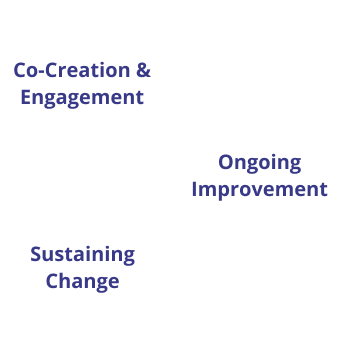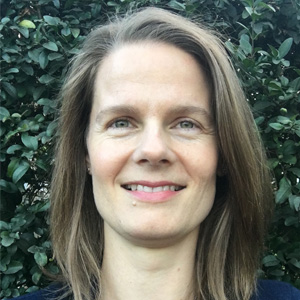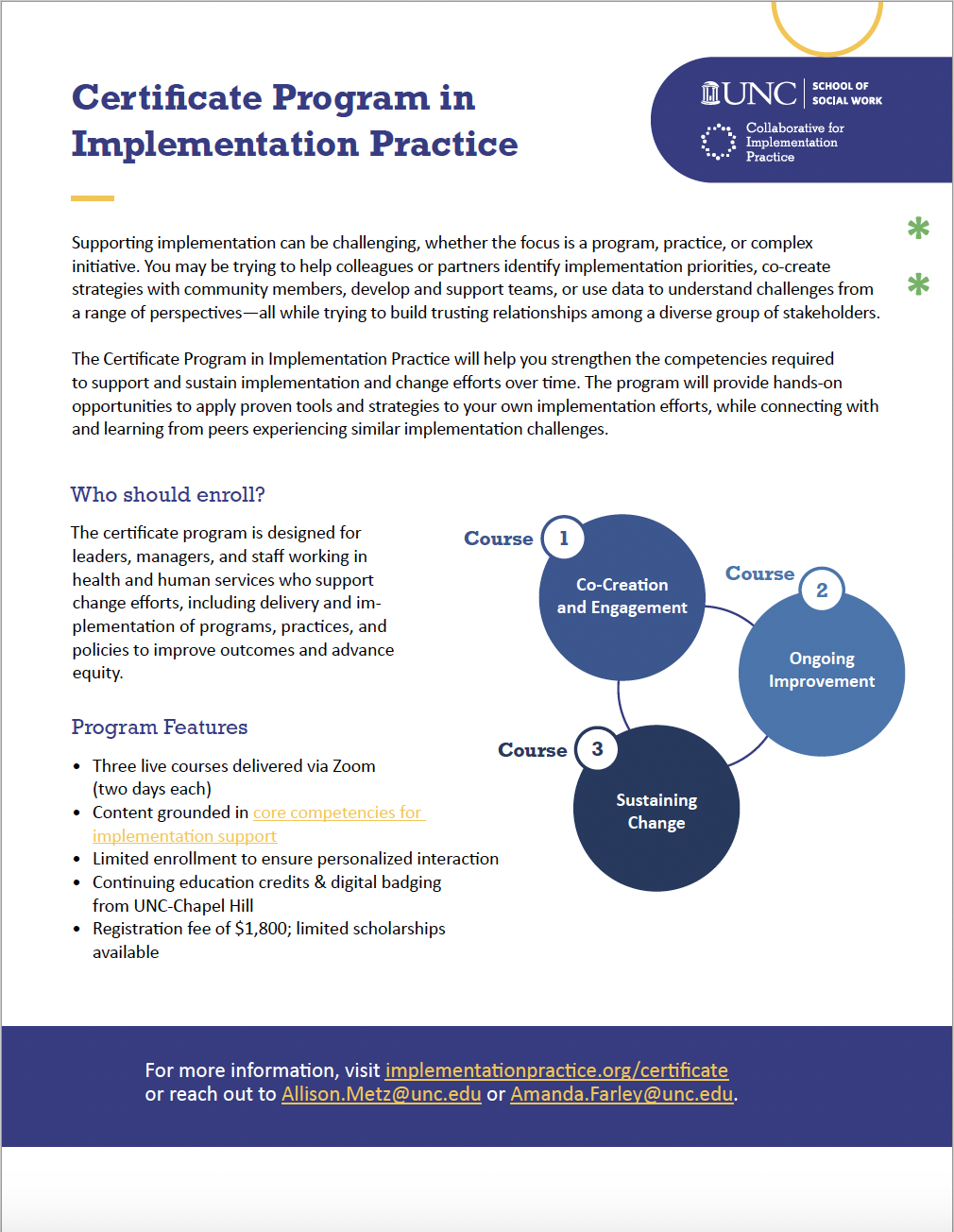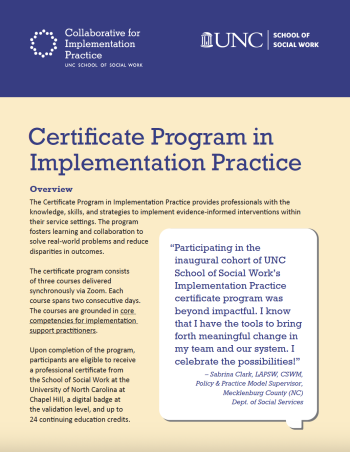Certificate Program in Implementation Practice

Supporting implementation can be challenging, whether the focus is a program, practice, or larger initiative. You may be trying to help colleagues or partners identify implementation priorities, co-create strategies with community members, develop and support teams, or use data to understand challenges from a range of perspectives—all while trying to build trusting relationships among a diverse group of stakeholders.
The Certificate Program in Implementation Practice will help you strengthen the competencies required to support and sustain implementation and change efforts over time. The program will provide hands-on opportunities to apply proven tools and strategies to your own implementation efforts, while connecting with and learning from peers experiencing similar implementation challenges.

Audience
The certificate program is designed for leaders, managers, and staff working in health and human services who support change efforts, including delivery and implementation of programs, practices, and policies to improve outcomes and advance equity.
Courses
The certificate program consists of three courses delivered synchronously via Zoom (i.e., remote delivery only). Each course spans two consecutive days. The courses are grounded in the core competencies for implementation support practitioners.

Following these two sessions, participants will be able to:
- Name and differentiate between competencies needed to co-create and engage with a range of implementation partners.
- Demonstrate an ability to foster co-learning using a one-to-one activity.
- Give examples of technical and relational strategies for building trusting relationships.
- Use the spectrum of engagement to identify current levels of engagement for implementation partners and assess whether a different level of engagement is needed.
- Plan for feasible opportunities to address power differentials and advance equity in their implementation effort.
- Distinguish how brokering and tailoring support strategies contributed to outcomes in a case example of a change effort.
- Employ empathy mapping as a method for tailoring support.
Following these two sessions, participants will be able to:
- Name and differentiate between competencies needed to support ongoing improvement of an implementation effort.
- Explain a process for assessing contextual fit and implementation feasibility of a program, practice or strategy and apply it to a case study.
- Give examples of implementation determinants and implementation strategies matched to those determinants.
- Develop a plan that matches implementation strategies to specific implementation challenges.
- Explain the Culture of Data Use Framework and strategies and identify tools to support meaning-making.
- Examine key activities used to carry out improvement cycles as illustrated by a case example.
- Choose specific facilitation techniques based on intended meeting goals.
Following these two sessions, participants will be able to:
- Name and differentiate between competencies needed to sustain an implementation or change effort.
- Compare and contrast four types of psychological safety for teams including the strategies used to build each type of psychological safety and the various impacts when they’re missing.
- Recognize the characteristics of effective champions and consider these characteristics when identifying champions.
- Explore a process for assessing and planning for sustainability of an implementation effort using the Sustainability Planning Tool.
- Name courageous leadership skills and identify strategies to support use of these leadership skills across implementation teams
- Describe how values can be used to drive implementation decision-making and examine how values have facilitated or hinder a current implementation effort.
- Give examples of strategies used to build implementation capacity and relate them to specific outcomes demonstrating whether capacity has been built.
Registration
**Registration for our spring 2024 Certificate Program has reached capacity and is currently closed. If you would like to be added to the waitlist, please complete this form.**
Thank you so much for your interest!
The cost of registration is $1,800 per person. A limited number of scholarships will be available on a rolling basis.*
Upon completion of all courses and related requirements, participants will receive a personalized certificate of completion (PDF format) that can be printed or saved, a digital badge from the University of North Carolina at Chapel Hill, and access to continuing education credits (see details below). Course requirements include full participation in all three synchronous (live) courses, completion of an Implementation Support Competencies Assessment pre- and post-program as well as completion of a brief knowledge check, evaluation, and reflection post following each course.
- Participants must register for and complete all three courses to receive a certificate and digital badge.
- Courses are not available as standalone offerings.
- Registration is limited to ensure personalized interaction.
- Registration will be accepted on a rolling basis until full.
*If you would like to be considered for financial assistance, please complete this form.

Faculty

Allison Metz
School of Social Work
University of North Carolina

Jen Agosti
JRA Consulting, Ltd.

Bianca Albers
Institute for Implementation Science in Health Care, University of Zurich

Ana Baumann
School of Medicine Washington University

Marita Brack
NHS Education for Scotland

Gina Chowa
School of Social Work
University of North Carolina

Lacy Dicharry
LacyDee Consulting, LLC

Amanda Farley
School of Social Work
University of North Carolina

Sophia Farmer
National Implementation Research Network
University of North Carolina

Iheoma Iruka
Department of Public Policy
University of North Carolina

Todd Jensen
School of Social Work
University of North Carolina

Audrey Loper
School of Social Work
University of North Carolina

Kimberly Mann
Child Protection Training Academy Illinois State University

Yolanda Perkins
National Implementation Research Network
University of North Carolina

Nakenge Robertson
School of Social Work
University of North Carolina

Caryn Ward
National Implementation Research Network
University of North Carolina

Eva Woodward
VA Center for Mental Healthcare and Outcomes Research and
University of Arkansas for Medical Sciences
Continuing Education
A total of 24 continuing education credits is available for the program (4 credits per day, 6 days total) for social workers, counselors, and psychologists.
To receive CEs for each course, you must be present for the entire course. No partial CEs will be given.
Refunds
For individuals enrolled in an open cohort, refunds will be issued if notified at least two weeks prior to the start of the first course. There will be no refunds issued after that time; however, you may transfer your place to a colleague prior to the start of the first course or receive credit for a future program.
For individuals enrolled in a closed cohort (i.e., coordinated between CIP and an organization/agency for their staff), refunds will not be issued. Individuals who are unable to participate may transfer their place to a colleague prior to the start of the first course.
Please contact amanda.farley@unc.edu to make arrangements, or if you have any other questions.
Grievance Procedure
Additional information on our procedures for handling grievances is available if action is required.
ADA Statement
If you require any of the auxiliary aids or services identified in the Americans with Disabilities Act in order to participate in this program, please email Amanda Farley at amanda.farley@unc.edu no later than two weeks before the program so we can best accommodate you.
Additional Questions
Please contact Amanda Farley at amanda.farley@unc.edu.

